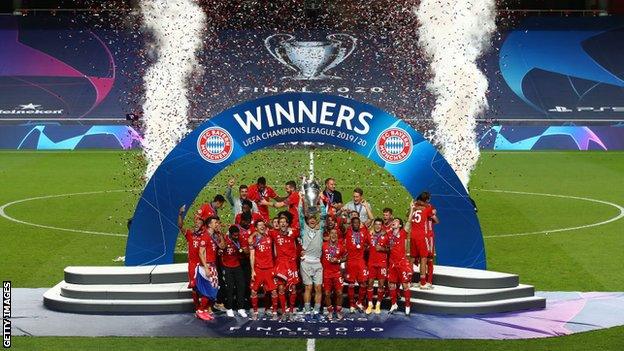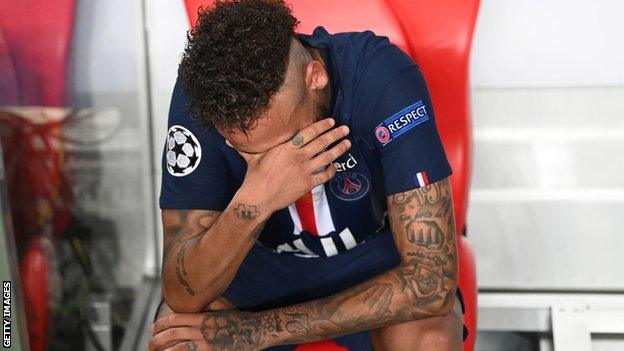Champions League final: 'New format was exciting but only as a one-off'
- Published
- comments

Bayern Munich won their sixth European title in their 11th final
This was a Champions League final like no other at the conclusion of a Champions League campaign like no other - but the outcome was the right one in the end as Bayern Munich were deservedly crowned kings of Europe for the sixth time.
The final was originally scheduled to take place in Istanbul's Ataturk Stadium on 30 May but was eventually staged 85 days later inside the vast, but virtually deserted, Stadium of Light in Lisbon.
Kingsley Coman's headed goal just before the hour gave Bayern victory and crowned a remarkably swift renaissance under coach Hansi Flick, who initially assumed interim charge after Niko Kovac was sacked in November, and left Paris St-Germain still with an empty space in their trophy cabinet where they want the Champions League to be.
This may have been a revamped knockout format because of the rescheduling forced on Uefa by the global coronavirus pandemic, but it was a success and no-one can seriously question Bayern's status as worthy winners.
Bayern are the first team to win every game in a single Champions League campaign and produced the performance of the tournament, thrashing Barcelona 8-2 in the quarter-finals as well as demolishing Tottenham 7-2 on their own ground in the group stage.
Some may question this enforced new format.
Did it work? Did it devalue the tournament? Yes. And no.
The knockout format, which involved one-off games from the quarter-final stage in a single city, in this case Lisbon, can be judged a success by any measure.
Of course the biggest game in club football should be played in front of a packed stadium, awash with colour and Uefa's occasionally ludicrous pre-match pageantry, but this was the reality and the new format worked with drama, goals, excitement and a final that was typically tense and tight.
These last two weeks have had the usual Champions League storylines.
The glorious underdogs of Atalanta were only denied in the closing moments by PSG. Manchester City were stunned by Lyon. No-one will forget the incredible night when one-time rulers Barcelona saw their kingdom come crashing down around them as they were tortured by Bayern, eight goals going in as the Catalan giants threw in the towel long before the final whistle.
The final itself was awash with sub-plots.
PSG paid hundreds of millions of pounds to entice Neymar and Kylian Mbappe only to be undone by Kingsley Coman, who they had as a youngster only to see him leave, first for Juventus and then on to Bayern.

Neymar was crying in the stands at full-time after Paris St-Germain failed to win their first Champions League title
It even had a redemption story in the figure of Philippe Coutinho, derided for leaving Liverpool for Barcelona in January 2018, subsequently missing out on a Champions League final appearance at the end of that season and watching from afar as his former club won it against Tottenham last season while his own career at the Nou Camp ran aground.
Coutinho is now a winner after coming on as a 68th-minute substitute for Bayern in Lisbon, the dysfunctional nature of his recent career - and the similar state of Barcelona - summed up by the Brazilian coming on as a substitute and scoring twice for his loan side against his parent club in that remarkable quarter-final.
So yes, the new format has been a success and the Champions League has the right winners.
For all that, however, this should be a one-off and the normal two-legged format should be restored if and when circumstances allow.
Uefa should resist the temptation to tamper with the format permanently, no matter how successful these last two weeks have been - but president Aleksander Ceferin has already been making noises suggesting this may not be the last we see of the new set-up.
These games have been dramatic and Uefa provided the perfect solution to the problem it faced, but the dramas the traditional format provided should not be wiped away.
Think of Manchester United's comeback against Juventus in the second leg of the 1999 Champions League semi-final.
Think of Chelsea's 2-2 draw against the odds against Pep Guardiola's Barcelona at the Nou Camp in 2012, Fernando Torres racing half the length of the field to secure a place in the final, and eventual victory against Bayern Munich in their own AllianzArena, after being reduced to ten men following captain John Terry's red card.
Think of Barcelona's remarkable recovery from 4-0 down to beat PSG in the last 16 in 2017, although the French side will harbour injustices forever about decisions that went against them in the Nou Camp that night.
Think of Liverpool's 4-0 win over Barcelona at Anfield in the 2019 semi-final that allowed them to somehow overturn a 3-0 deficit from the first leg against Lionel Messi, Luis Suarez and company.
And then the Champions League delivered Lucas Moura's winner for Tottenham against Ajax five seconds from time in Amsterdam the following night to give them victory on away goals from 3-0 down on aggregate to take them into the final in Madrid.
The last two weeks have been a credit to the teams involved and the organisation required to take the Champions League on a different road to the one originally intended - but hopefully normal service and schedules can be resumed when it is safe and possible to do so.
